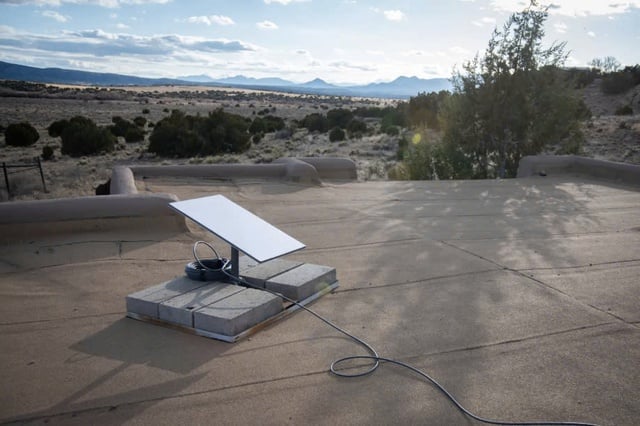The pilot policy for controlled telecommunications services using low-orbit satellite technology, as stipulated in National Assembly Decree 193/2025, has been further specified by Prime Minister's Decision 659/2025. This decision allows Space Exploration Technologies (SpaceX), owned by American billionaire Elon Musk, to invest in and provide Starlink satellite internet services in Vietnam.
Eliminate the internet's "white zone".
SpaceX's pilot program for satellite internet services will run for five years, starting from the date the wholly foreign-owned enterprise established by SpaceX in Vietnam is granted a telecommunications service business license, and must conclude before January 1, 2031.
Two types of satellite internet will be piloted nationwide: fixed satellite service (internet access service; leased lines for mobile base stations) and mobile satellite service (internet access service at sea and on airplanes). The maximum number of subscribers for the pilot program is 600,000.
According to the Frequency Department of the Ministry of Science and Technology , the Ku (12-18 GHz) and Ka (26-40 GHz) frequency bands are commonly used in broadband satellite internet services such as Starlink, OneWeb, and Telesat. Of these, the Ka band allows for higher data transmission speeds, and Vietnam has prepared this band for low-frequency satellite internet transmission.
Mr. Vu Hoang Lien, Chairman of the Vietnam Internet Association, assessed the Prime Minister's decision to allow SpaceX to invest in and provide Starlink satellite internet services in Vietnam as a step not only to develop Vietnam-US cooperation but also to demonstrate Vietnam's innovation and integration with the world. This move contributes to building confidence among foreign investors; it serves as a "test" to consider forming a special mechanism to create breakthroughs in science and technology development with a telecommunications enterprise model that does not limit the percentage of foreign investment.
According to Mr. Lien, the price of fiber optic internet packages in Vietnam is currently quite cheap, only 200,000-500,000 VND/month. Meanwhile, the business model of Starlink satellite internet in Vietnam is unclear, but in other markets, this service costs about 99 USD/month (equivalent to 2.4 million VND/month), not including equipment costs. "Generally, the price of satellite internet service is always higher than other types. However, using satellite internet will be suitable for places where fiber optic telecommunications infrastructure is not yet connected - such as remote areas, on ships, airplanes - and in urgent situations of natural disasters or epidemics," Mr. Lien observed.
According to the leaders of the Vietnam Internet Association, satellite internet cannot completely replace fiber optic cable but only adds connection space with a certain capacity and is intended for those willing to pay. Therefore, the pilot deployment of satellite internet services will not compete with or affect Vietnamese internet service providers.
From a different perspective, some experts believe that the emergence of Starlink internet could put significant pressure on traditional network operators, requiring telecommunications companies to accelerate infrastructure development and 5G coverage.

A Starlink satellite developed by SpaceX, the company of American tech billionaire Elon Musk. (Photo: Bloomberg)
Many economic benefits
Dr. Ho Diep - Director of Edunet Education Network Company Limited, lecturer at the International University of Ho Chi Minh City - believes that the pilot licensing of Starlink satellite internet deployment marks an important step in extending high-speed internet coverage to geographically inaccessible areas where 3G and 4G networks have not yet reached.
Specifically, according to Dr. Diep, satellite internet helps students in remote areas access the digital environment through online learning and online resources, thereby continuously updating their knowledge and preventing them from falling behind in the digital age. In the healthcare sector, this internet service supports more effective remote medical examinations and treatment thanks to its unlimited connection range, especially in emergency situations such as natural disasters and epidemics. In agriculture, satellite internet will promote high-tech farming and production without geographical limitations, allowing it to be carried out in areas with the most suitable soil and climate, instead of previously having to choose production areas with 3G, 4G, and 5G network infrastructure. At the same time, the Starlink satellite internet pilot project is also an opportunity to promote the development of the high-tech industry. "These benefits have actually been proven in other markets, such as the US," said Dr. Diep.
However, Mr. Diep pointed out that there are still many challenges in deploying satellite internet in Vietnam. The biggest obstacle lies in the service price, which is about 20 times higher than 4G and 5G networks and far beyond the affordability of many people. "Vietnam has many areas with complex mountainous and forested terrain, which can cause connection disruptions. In addition, cybersecurity and data security are also concerns," Mr. Diep stated.
Dr. Ho Diep proposed including more Vietnamese units and individuals in the deployment of satellite internet services and establishing a legal framework for data security when deploying this network. "Satellite internet offers many economic benefits, which is why Russia and China have deployed their own systems, Sphere and SpaceSail respectively. The investment costs are very high, around 10 billion USD, so Vietnam also needs to consider the effectiveness," Dr. Diep commented.
Serving multiple purposes
Satellite internet is used by countries for a variety of purposes, including providing internet connectivity in remote areas lacking fiber optic infrastructure, supporting disaster relief efforts, military communications, and serving businesses and education.
In developed countries, people typically use it for personal needs such as browsing the web, distance learning, and watching videos, while most developing countries use this service to serve government agencies or the military. For example, in the UK, Starlink has been available since 2021, primarily serving individual users in remote areas. In Australia, the Sky Muster satellite serves citizens and businesses, while in the US, it is also used for military purposes.
X. Mai
Source: https://nld.com.vn/ky-vong-vao-xung-luc-tu-internet-ve-tinh-196250401202445411.htm





![[Photo] Prime Minister Pham Minh Chinh presides over the conference announcing the establishment of the International Finance Centre in Vietnam.](/_next/image?url=https%3A%2F%2Fvphoto.vietnam.vn%2Fthumb%2F1200x675%2Fvietnam%2Fresource%2FIMAGE%2F2025%2F12%2F21%2F1766309817714_ndo_br_dsc-3400-jpg.webp&w=3840&q=75)
![[Photo] Prime Minister Pham Minh Chinh presides over a meeting on private sector economic development.](/_next/image?url=https%3A%2F%2Fvphoto.vietnam.vn%2Fthumb%2F1200x675%2Fvietnam%2Fresource%2FIMAGE%2F2025%2F12%2F20%2F1766237501876_thiet-ke-chua-co-ten-40-png.webp&w=3840&q=75)




























































































Comment (0)